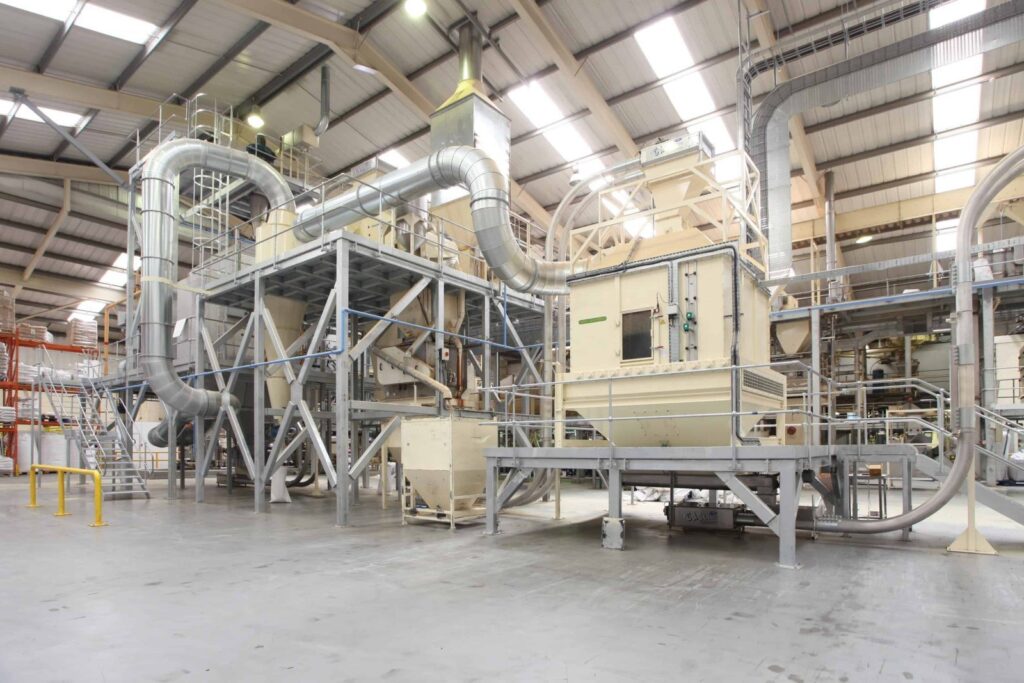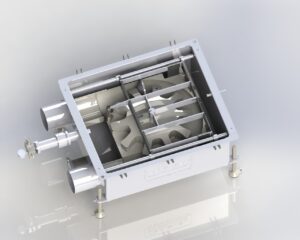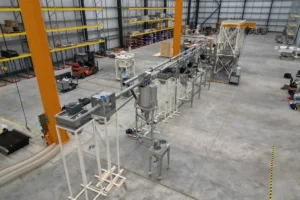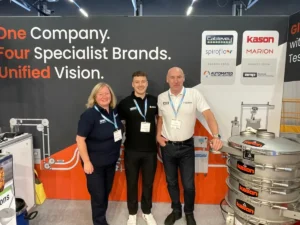Tube conveyors are a boon for pet food manufacturers, offering superior solutions for material handling. There are many advantages of tube conveyors for pet food manufacturers – these systems ensure the gentle, hygienic, and efficient transport of diverse pet food products, minimizing contamination risks and product degradation and preserving quality and integrity. Explore how pet food manufacturers are enhancing productivity, safety, and quality control by integrating these advanced conveyance systems into their production lines.
What Are the Advantages of Tube Conveyors for Pet Food Manufacturers?
Pet food manufacturers have many options for conveyors in their facilities, but not all conveyor solutions are optimal for this unique industry. Traditionally, bucket elevators have been used to transport pet food. However, these conveyor technologies have limitations in efficiency and are at risk for contamination because they are difficult to fully clean and sanitize. So, what’s the better option for pet food manufacturers?
Enclosed tubing offers a better solution. Tubular conveyor systems are easier to clean and can be placed back in service more quickly. Let’s take a look at the differences between bucket elevators and enclosed tubing for the transfer of materials in pet food manufacturing.
Traditional Bucket Elevator Systems Are No Longer a Standard Choice for Pet Food Production – Here’s Why
Bucket elevators carry bulk materials in vertical or inclined paths through the use of an endless conveyor belt system – a chain or chains to which buckets are attached, loading and discharging machinery, a drive arrangement, and a supporting frame or casing.
These systems are available in a variety of shapes, weights, and sizes and may use centrifugal or continuous buckets. Buckets and belts can often cause spills, require frequent maintenance, have limited layout options, and require a lot of space to operate. Perhaps, most importantly, they are not easy to clean thoroughly. Finding the most sanitary and flexible system often leads pet food manufacturers to choose enclosed tubing. Enclosed tubular conveyors are made of stainless steel that is naturally corrosion-resistant.
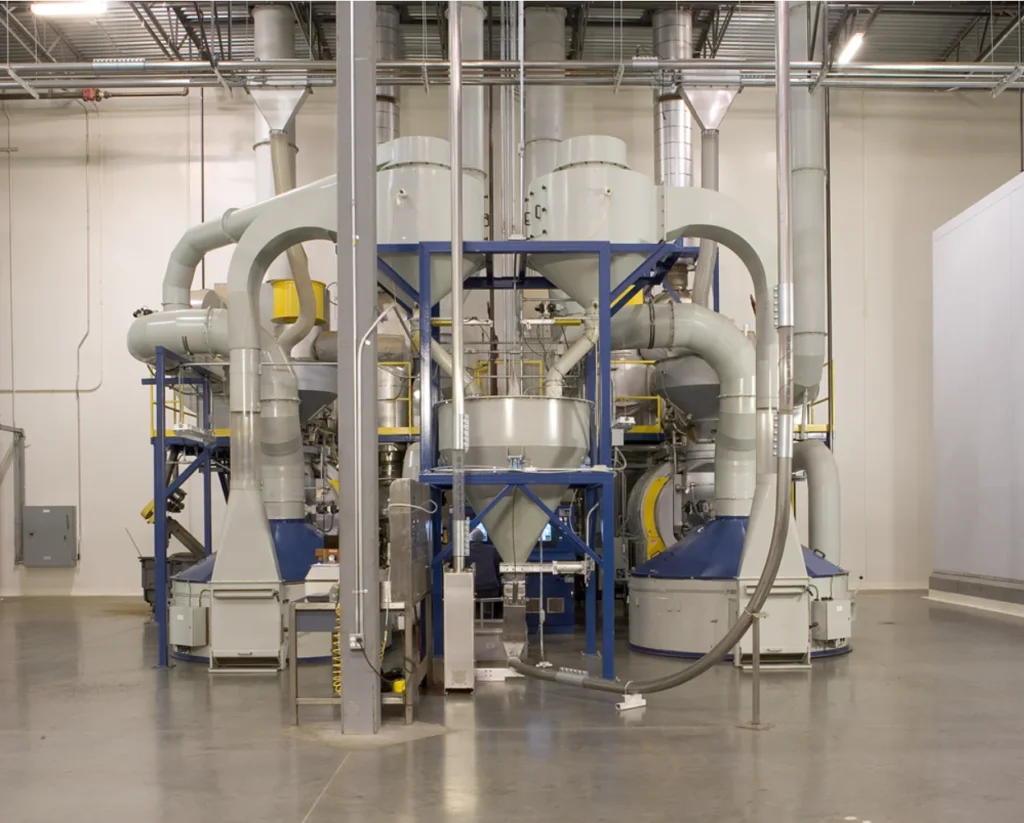
Sanitary Compliance Is One of the Key Considerations for Pet Food – That’s Why Tube Conveyors Are the Best Choice
Sanitary compliance is one of the biggest concerns for pet food manufacturers. Many types of ingredients have to be moved throughout the production process. These materials must meet the same sanitary requirements as human food. It’s economical and efficient to have an automatic conveyor system that offers a flexible layout and is easy to clean and operate. Traditional buckets are difficult to keep clean and lead to downtime when being serviced. Enclosed tubes remove most of these sanitary compliance concerns.
Tubular Conveying System Is Easier to Clean and Maintain Than a Bucket Elevator
In order to comply with food grade regulations set by the US Food and Drug Administration (FDA), the Food Safety Modernization Act (FSMA), and the Federal Food Drug and Cosmetic Act (FFDCA), pet food manufacturers must periodically clean their transport systems.
To meet these key sanitary standards, the steel used in the tube conveyors can incorporate a special finish that makes it easier to clean and sanitize. There are a number of different stainless steel alloys on the market with different properties. Alloy 304 is resistant to most corrosives, and Alloy 316 is even more so. Cablevey Conveyors has systems that use both.
Contact Cablevey Conveyors for the Best Tubular Conveyor Systems on the Market
Cablevey is one of the top conveyor manufacturers – we offer pet food conveyor systems that are suitable for moving all sorts of pet food materials and mixes. No matter what form your materials take, Cablevey Conveyors has top-quality systems that can move them in a gentle and sanitary manner.
Your company’s pet food conveyors can be engineered to service any part of the production process – from processing to mixing and packaging. Enjoy convenience, less downtime, and full sanitary compliance with Cablevey Conveyors – contact us to improve your facility’s production efficiency.
FAQ
How Do Tube Conveyors Ensure Hygienic Transport of Pet Food Products?
Tube conveyors are designed with enclosed tubing, reducing the risk of contamination from external sources. The use of stainless steel alloys, like Alloy 304 and 316, offers corrosion resistance, making these conveyors easier to clean and sanitize. They adhere to stringent food grade regulations, ensuring that pet food products are transported in a hygienic environment, maintaining their quality and safety throughout the production process.
Why Are Tube Conveyors a Better Option Than Bucket Elevators for Pet Food Manufacturers?
Tube conveyors offer numerous advantages over traditional bucket elevators. They are enclosed, minimizing contamination and spills. Tube conveyors are also easier to clean, ensuring compliance with sanitary standards. Their flexible layout options and efficient design lead to less downtime and maintenance. Made of corrosion-resistant stainless steel, tube conveyors ensure the gentle, safe, and efficient transport of pet food products.
How Do Tube Conveyors Contribute to Efficient Pet Food Production?
Tube conveyors enhance efficiency by offering easy cleaning, minimizing downtime, and ensuring sanitary compliance. Their enclosed design reduces the risk of spills and contamination. Cablevey’s tube conveyors are engineered for various parts of the production process, including processing, mixing, and packaging. The use of corrosion-resistant stainless steel ensures durability and compliance with stringent food safety standards.
What Materials Are Tube Conveyors Made of, and How Does This Benefit Pet Food Manufacturers?
Tube conveyors are typically made of corrosion-resistant stainless steel alloys like 304 and 316. This material is not only durable but also easy to clean and sanitize, ensuring that the conveyor system complies with food-grade regulations. Pet food manufacturers benefit from reduced maintenance time, enhanced hygiene, and the assurance of delivering safe, high-quality products to the market.
How Do Tube Conveyors Support Flexible Layout Options in a Pet Food Production Facility?
The tube’s design allows for customized conveyor installation according to the specific needs and spatial constraints of a production facility. Unlike bucket elevators that require ample space and have limited layout options, tube conveyors can be configured in various ways to optimize space utilization, streamline the production process, and enhance efficiency, making them a versatile choice for pet food manufacturers.
What Is the Significance of Using Different Stainless Steel Alloys in Tube Conveyors?
Different stainless steel alloys, such as Alloy 304 and 316, offer varied levels of corrosion resistance and durability. Alloy 316, for instance, provides enhanced corrosion resistance, making it suitable for harsher environments and ensuring the conveyor’s longevity. The choice of alloy impacts the conveyor’s maintenance, cleaning efficiency, and compliance with food safety regulations, directly influencing the quality of pet food products.
How Can Pet Food Manufacturers Ensure That Their Tube Conveyors Meet Food-Grade Regulations?
Ensuring that tube conveyors meet food-grade regulations involves selecting systems made of appropriate, easy-to-clean materials like stainless steel alloys. Regular maintenance and cleaning are crucial to comply with standards set by bodies like the FDA and FFDCA. Manufacturers should also opt for conveyor designs that minimize contamination risks, such as enclosed systems, to maintain the hygiene and safety of pet food products.
What Makes Cablevey Conveyors’ Tubular Systems Suitable for All Forms of Pet Food Materials and Mixes?
Cablevey Conveyors’ systems are engineered to move various forms of pet food materials gently and in sanitary conditions. The enclosed design minimizes contamination and degradation of products. Made with corrosion-resistant stainless steel, these conveyors are easy to clean and meet strict sanitary standards. They can be customized to fit different stages of production, from processing to packaging, ensuring efficiency and quality control.
How Do Tube Conveyors Help in Reducing Downtime in Pet Food Production?
Tube conveyors reduce downtime by being easier and faster to clean and maintain compared to traditional bucket elevators. Their enclosed and streamlined design minimizes the risk of spills and contamination, leading to less frequent and intensive cleaning needs. The use of corrosion-resistant materials also reduces wear and tear, ensuring that the conveyors remain operational for longer periods, enhancing production efficiency.
Why Is Sanitary Compliance a Crucial Factor in Selecting Conveyors for Pet Food Production?
Sanitary compliance is vital in pet food production to ensure the safety and quality of products, aligning with the stringent regulations akin to human food standards. Tube conveyors, with their easy-to-clean design and corrosion-resistant materials, address these concerns effectively. They minimize contamination risks, ensuring that pet food is produced, processed, and packaged in a hygienic environment, instilling confidence in both manufacturers and consumers.

